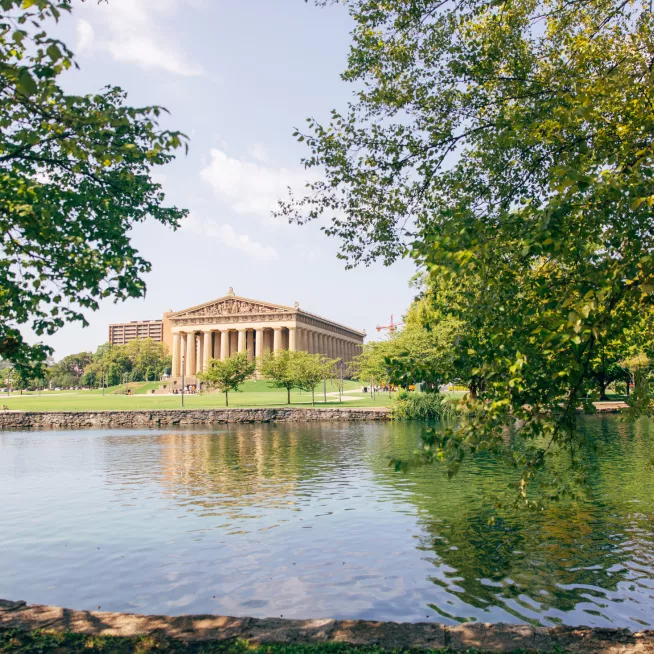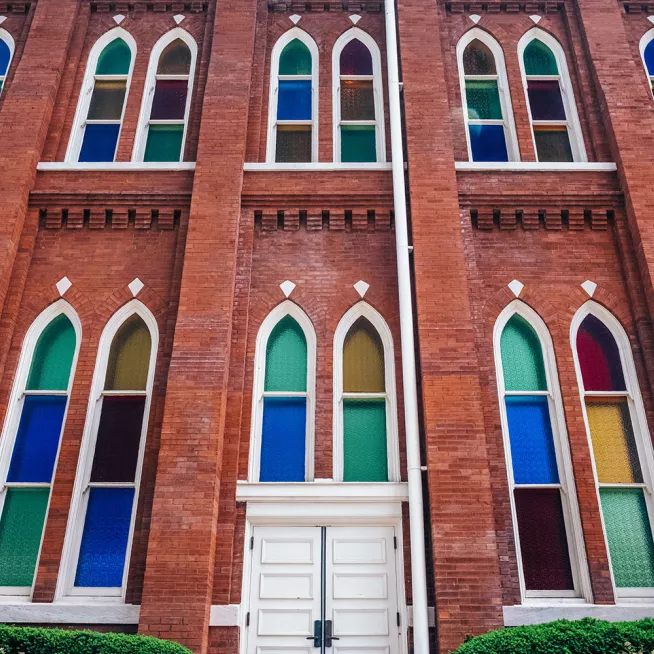Breadcrumb
Career-Spanning Exhibition of Works by María Magdalena Campos-Pons Features Photography, Installation, Video, Painting, and Performance
The Frist Art Museum presents María Magdalena Campos-Pons: Behold, a sweeping exhibition of photography, installation, video, painting, and performance spanning the nearly four-decade career of the Cuban-born artist who now lives and works in Nashville.
NASHVILLE, TN — The Frist Art Museum presents María Magdalena Campos-Pons: Behold, a sweeping exhibition of photography, installation, video, painting, and performance spanning the nearly four-decade career of the Cuban-born artist who now lives and works in Nashville. Organized by the Brooklyn Museum and the J. Paul Getty Museum, the exhibition will be on view in the Frist’s Ingram Gallery from September 27, 2024, through January 5, 2025.
The first survey of Campos-Pons’s work since 2007,Behold brings together career highlights and new works, along with a multimedia series on view for the first time in the United States. In more than 50 richly layered artworks, sketchbooks, and documented performances, the artist draws on her memories and experiences as well as her family’s story to examine the histories of enslavement, indentured labor, motherhood, migration, and race. The exhibition audio guide will feature Campos-Pons speaking about selected works.
“Campos-Pons is a witness, chronicler, and oracle, telling stories that are emotionally powerful and searingly honest,” writes Frist Art Museum chief curator Mark Scala. “Whether in expressions of family bonds and spiritual engagement or indictments of colonial history and its ongoing legacy of racism, they all point to the capacity of art to overcome hurt through the healing power of love.” Born in Matanzas, Cuba, in 1959, Campos-Pons incorporates Yoruba-derived Santería symbolism in her work but also references her experiences living in Boston, Italy, and Nashville, where she has been the Cornelius Vanderbilt Endowed Chair Professor of Fine Arts at Vanderbilt University since 2017. In 2011, the Frist organized an exhibition titled Journeys that featured Campos-Pons’s photography and multimedia works that explored aspects of the transatlantic slave trade broadly and her family’s particular history in the sugar industry.
Beyond her artistic practice, Campos-Pons has made significant contributions to the larger art world and to Tennessee by founding and leading the Engine for Art, Democracy, and Justice, a trans-institutional initiative between Vanderbilt, the Frist, Millions of Conversations, and Fisk University that brings scholars, critics, and artists from around the world together for artist interventions, exhibitions, seminars, and other programs. She launched the exhibition Intermittent Rivers in her hometown of Matanzas, Cuba, as part of the Havana Biennial, and served as the consulting curator for the 2023 Tennessee Triennial. In 2023, she was named a MacArthur Fellow in recognition of her groundbreaking synthesis of cultures and mediums in advocating for art’s capacity to heal individuals and society.
Entering the exhibition, the theme of beholding is immediately evident in the first work visitors see—the monumental triptych Secrets of the Magnolia Tree (2021), which features a self-portrait of Campos-Pons with head cupped in her hands in an expression of sorrow at the tragic conditions that she is witnessing. “The artist stares out at us, her eyes large and owl-like to indicate that she misses nothing. She is flanked by gigantic blossoms of the beautiful magnolia trees often associated with the South,” writes Scala. “For Campos-Pons, the theme of being witness to history is doubled—the owl is all-seeing, and the long-lived magnolia is itself a silent observer of centuries of racism, injustice, violence, and oppression.”
Some of Campos-Pons’s most important and celebrated works are featured in Behold, including the immersive video installation Spoken Softly with Mama (1998, co-created with Neil Leonard), which honors the everyday lives, domestic labor, and intergenerational bonds of the women in her family. This is one of a series of three installations, titled History of a People Who Were Not Heroes, seen together for the first time in this exhibition.
In De Las Dos Aguas (Of the Two Waters) (2007), a multipart Polaroid work, the themes and references more explicitly reflect the Santería religion, which incorporates a mixture of Yoruba and Catholic faith traditions in Cuba and has played an important role in Campos-Pons’s family. Her grandmother was a Santería priestess, and throughout the artist’s work are allusions to the religion’s restorative power and protective Yoruba deities called orishas. In De Las Dos Aguas, Campos-Pons uses self-portraiture to evoke the powerful orishas Yemayá and Oshun, depicted as divine protectors of migrants holding a boat that bridges an ocean.
The exhibition also includes rarely seen works such as Umbilical Cord (1991), a photographic assemblage of bellies painted with footprints and outstretched arms created in collaboration with the artist’s mother and sisters after Campos-Pons left Cuba, signifying the centrality of matrilineal connections to her sense of identity. In a related vein, Baño Sagrado (Rite of Initiation, Sacred Bath) (1991, cocreated with Neil Leonard), is an autobiographical video that poetically speaks to the artist’s distance from her family and to how she reconnects with Cuba in her practice via Santería and oral traditions.
During the COVID-19 pandemic, Campos-Pons created new works in her Nashville studio including Miasma (2020), a series of intimately scaled watercolor paintings that contemplate contagion and connection, and Rise of the Butterflies (2021), a series of watercolors, photographs, and vibrant blown-glass mobiles—several of which memorialize Breonna Taylor, who was killed in 2020 in her own home by Louisville police officers.
Campos-Pons has been included in major exhibitions worldwide, including the Sharjah Biennial in the UAE (2023), Documenta 14 (2017), Venice Biennale (2013, 2001), Havana Biennial (2012, 2019, 1991, 1989), the Guangzhou Triennial (2008), her traveling mid-career survey Everything Is Separated by Water (2007), the Dak’Art Biennial in Dakar (2004), and more, as well as numerous university and college museum presentations, speaking to her influence as an educator, thinker, and experimental artist.
Publication
The exhibition is accompanied by a richly illustrated publication designed by Morcos Key documenting the span of Campos-Pons’s career with essays by Carmen Hermo, Mazie Harris, Jenée-Daria Strand, Phillip Townsend, and Selene Wendt, as well as an introduction by artist and cultural theorist Amalia Mesa-Bains. Co-published by the J. Paul Getty Museum and the Brooklyn Museum.
Programs
Thursday, September 26, 6:30 p.m.
Performance: A Mother’s River of Tears
Auditorium
Free; first come, first seated
María Magdalena Campos-Pons in collaboration with Kamaal Malak reprise this immersive performance A Mother’s River of Tears, which debuted at the opening of Beholdat the Brooklyn Museum in 2023.
Drawing on ancestral rituals from the Yoruba people, this performance—a mesmerizing synthesis of dance, poetry, live music, video, and more—is a manifestation of many healing themes mirrored inBehold. It poetically commemorates the lives of Black men and women whose journeys were interrupted as result of historical fractures in the delivery of justice.
Friday, September 27, noon
Conversation: María Magdalena Campos-Pons and Carmen Hermo
Auditorium
Free; first come, first seated
Join María Magdalena Campos-Pons and Carmen Hermo, associate curator, Elizabeth A. Sackler Center for Feminist Art, Brooklyn Museum, for this conversation about the exhibition.
Exhibition Credit
María Magdalena Campos-Pons: Behold is organized by the Brooklyn Museum and the J. Paul Getty Museum.
The exhibition is curated by Carmen Hermo, Associate Curator, Elizabeth A. Sackler Center for Feminist Art, Brooklyn Museum and Mazie Harris, Associate Curator, Department of Photographs, J. Paul Getty Museum with Jenée-Daria Strand, former Curatorial Associate, Elizabeth A. Sackler Center for Feminist Art, Brooklyn Museum.
###







